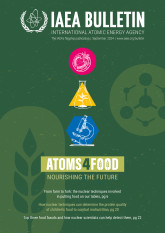Food irradiation is the exposure of food to beams or rays that have enough energy to break chemical bonds (also known as ‘ionizing radiation’). By using beams to efficiently transfer energy without significantly increasing temperature, irradiation can be used on pre-packaged food to prevent insect breeding, kill spoilage organisms and destroy microbes responsible for food poisoning, while also slowing down ripening.
Depending on the dose delivered, food irradiation ensures that fruit and root vegetables do not sprout or ripen prematurely; parasites are killed and spices decontaminated; food poisoning organisms such as salmonella are destroyed; fungi that could spoil meat, poultry and seafood are eliminated; and food shipments meet the international trade regulations necessary to prevent the spread of pests and diseases harmful to plants and the environment.










